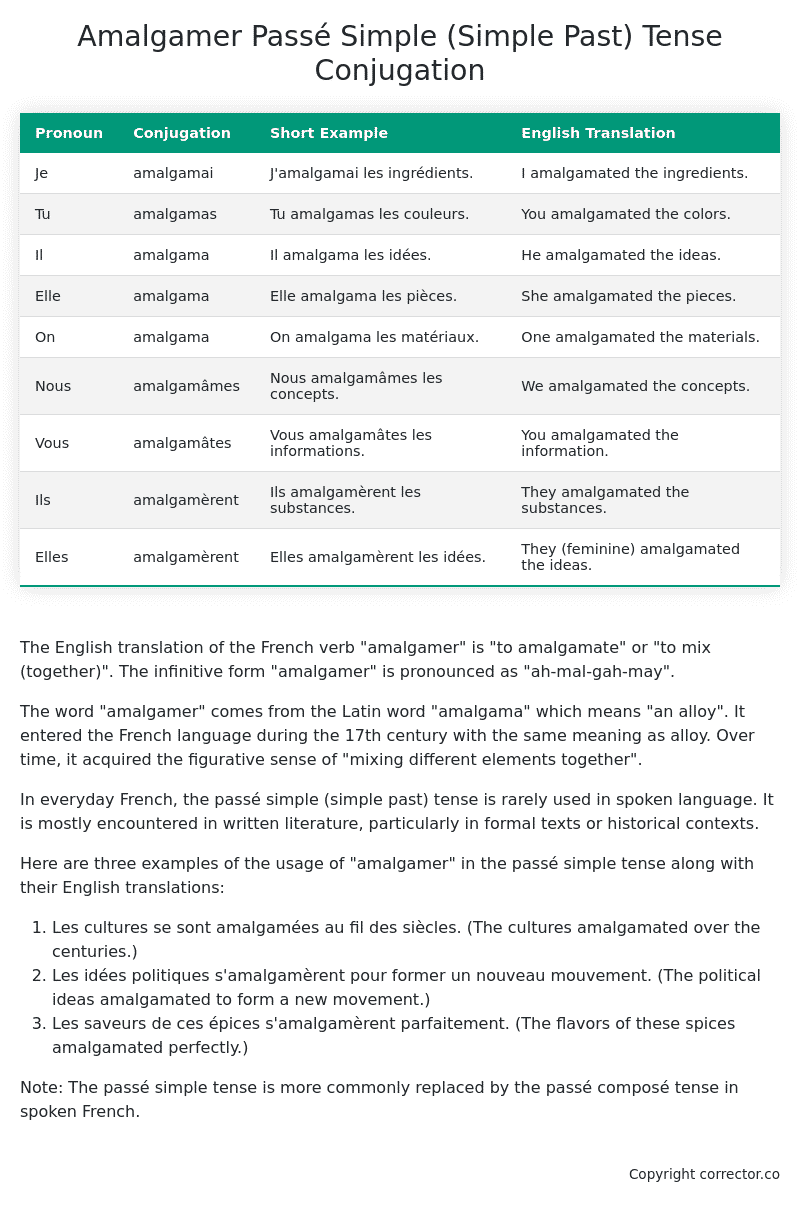Passé Simple (Simple Past) Tense Conjugation of the French Verb amalgamer
Introduction to the verb amalgamer
The English translation of the French verb “amalgamer” is “to amalgamate” or “to mix (together)”. The infinitive form “amalgamer” is pronounced as “ah-mal-gah-may”.
The word “amalgamer” comes from the Latin word “amalgama” which means “an alloy”. It entered the French language during the 17th century with the same meaning as alloy. Over time, it acquired the figurative sense of “mixing different elements together”.
In everyday French, the passé simple (simple past) tense is rarely used in spoken language. It is mostly encountered in written literature, particularly in formal texts or historical contexts.
Here are three examples of the usage of “amalgamer” in the passé simple tense along with their English translations:
- Les cultures se sont amalgamées au fil des siècles.
(The cultures amalgamated over the centuries.) - Les idées politiques s’amalgamèrent pour former un nouveau mouvement.
(The political ideas amalgamated to form a new movement.) - Les saveurs de ces épices s’amalgamèrent parfaitement.
(The flavors of these spices amalgamated perfectly.)
Note: The passé simple tense is more commonly replaced by the passé composé tense in spoken French.
Table of the Passé Simple (Simple Past) Tense Conjugation of amalgamer
| Pronoun | Conjugation | Short Example | English Translation |
|---|---|---|---|
| Je | amalgamai | J’amalgamai les ingrédients. | I amalgamated the ingredients. |
| Tu | amalgamas | Tu amalgamas les couleurs. | You amalgamated the colors. |
| Il | amalgama | Il amalgama les idées. | He amalgamated the ideas. |
| Elle | amalgama | Elle amalgama les pièces. | She amalgamated the pieces. |
| On | amalgama | On amalgama les matériaux. | One amalgamated the materials. |
| Nous | amalgamâmes | Nous amalgamâmes les concepts. | We amalgamated the concepts. |
| Vous | amalgamâtes | Vous amalgamâtes les informations. | You amalgamated the information. |
| Ils | amalgamèrent | Ils amalgamèrent les substances. | They amalgamated the substances. |
| Elles | amalgamèrent | Elles amalgamèrent les idées. | They (feminine) amalgamated the ideas. |
Other Conjugations for Amalgamer.
Le Present (Present Tense) Conjugation of the French Verb amalgamer
Imparfait (Imperfect) Tense Conjugation of the French Verb amalgamer
Passé Simple (Simple Past) Tense Conjugation of the French Verb amalgamer (You’re reading it right now!)
Passé Composé (Present Perfect) Tense Conjugation of the French Verb amalgamer
Futur Simple (Simple Future) Tense Conjugation of the French Verb amalgamer
Futur Proche (Near Future) Tense Conjugation of the French Verb amalgamer
Plus-que-parfait (Pluperfect) Tense Conjugation of the French Verb amalgamer
Passé Antérieur (Past Anterior) Tense Conjugation of the French Verb amalgamer
Futur Antérieur (Future Anterior) Tense Conjugation of the French Verb amalgamer
Subjonctif Présent (Subjunctive Present) Tense Conjugation of the French Verb amalgamer
Subjonctif Passé (Subjunctive Past) Tense Conjugation of the French Verb amalgamer
Subjonctif Imparfait (Subjunctive Imperfect) Tense Conjugation of the French Verb amalgamer
Subjonctif Plus-que-parfait (Subjunctive Pluperfect) Tense Conjugation of the French Verb amalgamer
Conditionnel Présent (Conditional Present) Tense Conjugation of the French Verb amalgamer
Conditionnel Passé (Conditional Past) Tense Conjugation of the French Verb amalgamer
Conditionnel Passé II (Conditional Past II) Tense Conjugation of the French Verb amalgamer
L’impératif Présent (Imperative Present) Tense Conjugation of the French Verb amalgamer
L’impératif Passé (Imperative Past) Tense Conjugation of the French Verb amalgamer
L’infinitif Présent (Infinitive Present) Tense Conjugation of the French Verb amalgamer
L’infinitif Passé (Infinitive Past) Tense Conjugation of the French Verb amalgamer
Le Participe Présent (Present Participle) Tense Conjugation of the French Verb amalgamer
Le Participe Passé (Past Participle) Tense Conjugation of the French Verb amalgamer
Struggling with French verbs or the language in general? Why not use our free French Grammar Checker – no registration required!
Get a FREE Download Study Sheet of this Conjugation 🔥
Simply right click the image below, click “save image” and get your free reference for the amalgamer Passé Simple tense conjugation!

Amalgamer – About the French Passé Simple (Simple Past) Tense
Formation
Usage
Narration
Historical Context
Interactions with other tenses
Passé Composé
Imparfait
Conditional and Subjunctive
Summary
I hope you enjoyed this article on the verb amalgamer. Still in a learning mood? Check out another TOTALLY random French verb conjugation!


